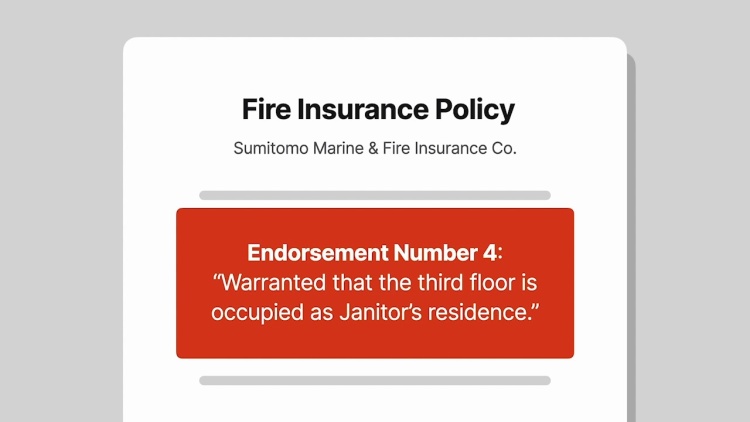Vlastos v. Sumitomo Marine & Fire Insurance Company
United States Court of Appeals for the Third Circuit
707 F.2d 775 (1983)
- Written by Genan Zilkha, JD
Facts
Evelyn Vlastos (plaintiff) owned a four-story building in Pittsburgh, Pennsylvania. Vlastos and her son operated a bar and luncheonette on the first floor of the building. An unrelated corporation operated a massage parlor on the second floor and used part of the third floor. Vlastos stored supplies and maintained an office on the fourth floor. A portion of the third floor was also used as a residence for the building’s janitor. When Vlastos obtained insurance for the building, the insurance policy included a warranty that was incorporated into the policy. This warranty, titled Endorsement No. 4, contained the following language: “Warranted that the 3rd floor is occupied as Janitor’s residence.” On April 23, 1980, a fire broke out in the building. The insurer, Sumitomo Marine & Fire Insurance Company (Sumitomo) (defendant), refused to pay the resulting insurance claim, alleging that Vlastos had breached the warranty by permitting the third floor to be used as something other than a janitor’s residence. Vlastos filed suit against Sumitomo, seeking recovery on the insurance claim. The district court ruled that the warranty in Endorsement No. 4 required the third floor to be used exclusively as a janitor’s residence. The jury found that Vlastos had breached the warranty. Vlastos appealed.
Rule of Law
Issue
Holding and Reasoning (Adams, J.)
What to do next…
Here's why 907,000 law students have relied on our case briefs:
- Written by law professors and practitioners, not other law students. 47,100 briefs, keyed to 996 casebooks. Top-notch customer support.
- The right amount of information, includes the facts, issues, rule of law, holding and reasoning, and any concurrences and dissents.
- Access in your classes, works on your mobile and tablet. Massive library of related video lessons and high quality multiple-choice questions.
- Easy to use, uniform format for every case brief. Written in plain English, not in legalese. Our briefs summarize and simplify; they don’t just repeat the court’s language.





